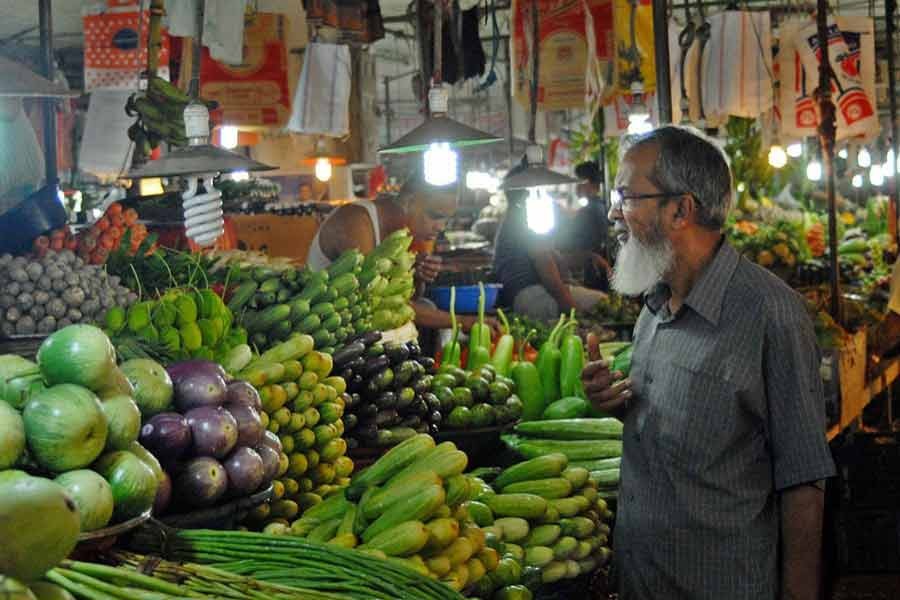Inflation is rising across the world. Households in many countries as a result have started to feel the pinch of price hikes of essential commodities and services like food, housing, energy and transport. Thus, the cost of living is rising at a faster rate than the incomes and wages of most people. Bangladesh is also no different where a large number of people are grappling with increasing living costs when jobs and incomes have taken a big hit due to the pandemic. The official rate of inflation, however, does not fully reflect the rising cost of living due to some flaws in estimating the inflation.
Bangladesh Bureau of Statistics (BBS) estimate showed that the monthly inflation rate in January this year declined to 5.86 per cent from 6.05 per cent in December last year. It also estimated that food inflation increased slightly to 5.60 per cent in January from 5.46 per cent in December last. At the same time, non-food inflation declined to 6.26 per cent from 7.0 per cent during the period under review. Thus the national inflation statistics acknowledge that there are some pressures on prices regarding food although overall price inflation is still at a comfortable level.
Over the last couple of years, there is an apprehension among many that the official inflation statistics does not properly accommodate the price trend of goods and services. Some also argued in favour of revising and improving the method of inflation calculation. The national statistical agency is yet to respond duly in this regard and is still using 2005-06 as the base year to calculate inflation based on the Consumer Price Index (CPI).
No doubt that revising or updating the CPI as well as the method of inflation calculation is a challenging task. Even so, it is importanted to get a more accurate picture and adjust the policy accordingly.
Though the monthly inflation rate in January declined slightly after a continued rise for six months, the annual average rate of inflation increased in January to 5.62 per cent from 5.54 per cent in December last. This also reflects the undeniable pressure of rising prices.
Putting the official estimation aside, one can easily see the hard time the limited and low-income people are going through. The price of rice is high in the kitchen markets. Even BBS data on average retail prices in open markets acknowledged that the price of rice has increased, although very little. The prices of lentils, oil and sugar have increased exponentially in the last few months. BBS data showed that the average price of soyabean oil (best quality) per litre increased to Tk 160.10 in January from Tk 156.25 in December last. The price of edible oil has increased by 70 per cent within a year, according to Bangladesh Trading Corporation (TCB) data. The prices of many other daily commodities have also gone up. The transport cost increased by some 30 to 40 per cent at a time after the diesel price hike in November last.
Now the utility service providers want to increase the prices of water, electricity and gas by 20 per cent, 70 per cent and 115 per cent respectively. The companies argue that the price hike is necessary to cut or adjust the losses due to the higher cost of providing the services. Any rise in prices of the utilities will make the lives of people more difficult and their costs of living will increase further. In this way, inflationary pressure will also intensify in the near future. Though the utility service providers need to address bad governance and corruption to reduce the cost, they are passing the buck tothe people to compensate for their irregularities and inefficiencies. As the holy month of Ramadan is approaching, people are apprehending a further rise in the essentials prices in the near future. All these have already created higher inflation expectations.
What is pathetic to note is the indifference of the country's policymakers about the mounting pressure of inflation. Though some of them have acknowledged that inflation is a matter of concern, there is no clear indication from them about intensifing the fight against inflation.
Bangladesh Bank, the central bank of the country, is also keeping mum in this regard as the BBS-generated official inflation figure is still below 6.0 per cent level and so there is little to worry about! Instead, the central bank has been continuing its expansionary monetary stance to support economic growth presuming that the current phase of recovery is still incomplete and needs policy support. That's why there is no rate hike for the last two years.
It is not that Bangladesh Bank is indifferent to inflation pressure. More than four months back, in its quarterly report (Q3, 2021), the central bank mentioned that "headline inflation is expected to peak up in the coming months due to a sharp rise in global energy prices and an upturn in inflation outlook in advanced and emerging market economies. Moreover, supply-side disturbances and the pass-through effect of input cost to output prices on the back of rising domestic demand will remain a concern to the inflation forecast."
Even if the official inflation figure does not adequately reflect the increasing pressure of prices, the central bank has other indicators to gauge the inflationary pressure and expectation. The exponential rise in imports has already widened the trade deficit and the big depreciation of the local currency against the US dollar is an indication of the mport inflation.
In this connection, Bangladesh Bank needs to go for a modest rate hike. The rate hike will ring an alarm bell regarding the inflationary pressure and policymakers will be more active to address the issue. It will also recognise that inflation is approaching a serious level. The rate hike will also indicate that BBS estimation of inflation needs to be reviewed carefully.


